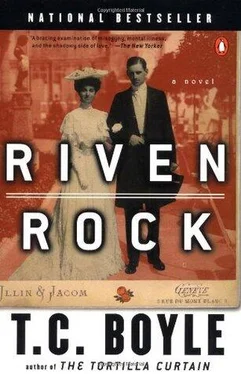T. Boyle - Riven Rock
Здесь есть возможность читать онлайн «T. Boyle - Riven Rock» весь текст электронной книги совершенно бесплатно (целиком полную версию без сокращений). В некоторых случаях можно слушать аудио, скачать через торрент в формате fb2 и присутствует краткое содержание. Год выпуска: 1999, Издательство: Penguin Books, Жанр: Современная проза, на английском языке. Описание произведения, (предисловие) а так же отзывы посетителей доступны на портале библиотеки ЛибКат.
- Название:Riven Rock
- Автор:
- Издательство:Penguin Books
- Жанр:
- Год:1999
- ISBN:нет данных
- Рейтинг книги:5 / 5. Голосов: 1
-
Избранное:Добавить в избранное
- Отзывы:
-
Ваша оценка:
- 100
- 1
- 2
- 3
- 4
- 5
Riven Rock: краткое содержание, описание и аннотация
Предлагаем к чтению аннотацию, описание, краткое содержание или предисловие (зависит от того, что написал сам автор книги «Riven Rock»). Если вы не нашли необходимую информацию о книге — напишите в комментариях, мы постараемся отыскать её.
Riven Rock — читать онлайн бесплатно полную книгу (весь текст) целиком
Ниже представлен текст книги, разбитый по страницам. Система сохранения места последней прочитанной страницы, позволяет с удобством читать онлайн бесплатно книгу «Riven Rock», без необходимости каждый раз заново искать на чём Вы остановились. Поставьте закладку, и сможете в любой момент перейти на страницу, на которой закончили чтение.
Интервал:
Закладка:
Stanley was a prince through it all, though he refused to hear any criticism of his mother — he wouldn’t even allow Katherine to mention her without bunching up the muscles of his jaw till they began to shift beneath the skin like some sort of abnormal growth. He was dutiful and patient, the soul of propriety, and never once did he let a thought of socialism or Eugene Debs come between him and the determined campaign of acquisition Katherine had embarked on: they did have a house to fill, after all. Or would have soon. There was only one thing in which he continued to fail her, the biggest thing, the ultimate thing, the thing all the creatures of the earth did as naturally and unconsciously as they drew breath and ate and gamboled in the fields, and there was no fulfillment without it, no security, no consummation, no hope.
Each night was a repetition of the first. He was busy. He was worried. The Harvester Company. Correspondence. Accounts. Bills. If she would just give him a minute, just a minute…. Alone, in their rooms, just before retiring, he would take her hand, bend to her with a formal kiss and excuse himself, and no matter how seductive she tried to be, how suggestive or shy or elaborately unconcerned, he sat at his desk in a sea of paper until she gave up and found her bleary way to bed. That was her hidden affliction, that was her sorrow, and she blamed Nettie for it — the proximity of Nettie, Nettie’s face and image and her fierce emasculating will: if she couldn’t have her son, then no one could.
Finally, in desperation, Katherine hit on the idea of a motor tour to the south of France, a tour that would be certain to deflect both mothers, what with the dust and mud and sheer barbarity of the lurching, fuming, backfiring monster of a contraption they would be expected to immure themselves in for days at a time, and hadn’t Nettie sworn she would never set foot in an automobile as long as she lived? Yes, of course: a motor tour. What could be better? Katherine woke with the inspiration one crisp morning in October and let it incubate while the maid laid out her clothes and she brushed her hair and studied her face in the mirror. She waited till the waiter had brought their breakfast and Stanley was poking idly through the newspaper, and then she let out a little gasp and clasped her hands together, as if the notion had just come to her. “Stanley,” she exclaimed, “I’ve just had the most wonderful idea!”
But yet again, Katherine had underestimated her adversary — and her own mother, for that matter. Both women greeted the plan enthusiastically, and when the morning of their departure arrived, Nettie and Josephine appeared at the Ritz in identical motoring costumes, a sort of pale dust-colored webbing that covered them from crown to heel and suggested nothing so much as beekeeping or an escape from the seraglio. Stanley climbed into the front seat beside the chauffeur and took the wheel himself, while Katherine and the cocooned mothers jostled for position on the narrow rear seat. They got no farther than Montrouge before the first tire blew, and after languishing beneath an unseasonably warm sun for an hour and a half while Stanley and the chauffeur patched it, they made two brisk miles to Bagneux before mechanical failure forced them to call it a day.
Naturally, the inn at Bagneux was considerably less than what they might have hoped for, and Stanley’s mother, crusty and outraged, was the principal soloist in a chorus of complaint. Katherine was testy herself, and at dinner that night, after they’d staggered up three narrow flights to rooms that were like pigeon coops, she found herself drawn into a ridiculous argument with her mother-in-law over the French pronunciation of “orange.” They’d all changed and freshened up and settled themselves in the dining room with a decent sparkling wine and a consommé madrilène that was really quite refreshing, and the waiter had just taken their orders, when Nettie, grimacing sourly under the baggage of a bad day, leaned toward Katherine and said, “You pronounce that like a foreigner.”
Katherine looked to Stanley, but he was studying the wine list so earnestly you would have thought he was going to be quizzed on it, and then looked to her mother, but Josephine could only shrug. “Pronounce what? ”
Nettie drew herself up, her tongue working behind her teeth to produce a nasty mincing parody of Katherine’s French: “Canard à low-ron-zheh.”
“And how, pray tell, am I supposed to say it?”
“Like an American. Because that’s what you are, despite all your Geneva airs, and you should be proud of it, like Stanley is — aren’t you, Stanley?”
Stanley gazed up from the wine list. He looked mystified and vaguely guilty, as if he were being punished for something he hadn’t done. “I — well — I, yes,” he said in a low voice.
“I’m sure it’s just a matter of—” Josephine began, but Nettie cut her off.
“Decent people,” Nettie hissed, “do not talk like”—and here she paused to glance round the table, stern, pampered, autocratic, an empress of money, McCormick money— “Frogs. ”
Katherine was so outraged she wanted to smash every bit of crockery on the table and walk out the door and never come back, but she restrained herself — for Stanley’s sake. “Yes,” she said, barely able to conceal the contempt in her voice, “and how do you pronounce it then?”
All eyes were on the old woman in the adamantine hat, and she savored the moment, held it just a beat, and said: “Awwrenge. ”
So it went for the three and a half weeks it took them to get to Nice. They were constantly thrust together, exposed to all sorts of weather and every conceivable type of roadway, from cobbled village streets to cartpaths that began in the middle of nowhere and wound up at the end of it. Everyone was irritable, even Katherine’s mother, who was the gentlest, most even-tempered woman alive, and by the end of the trip they were taking their meals in a brooding silence broken only by the occasional murmured request for salt. or vinegar to rub into their wounds. It was an unmitigated disaster. Hateful. Utterly hateful. And Katherine, the scientist, always alert for unusual specimens, was ready to write all the major journals and testify that she’d discovered the single most horrible and irritating member of the human species, and to name her too so there would be no mistake about it: Nettie Fowler McCormick.
And then, miraculously, Nettie threw in the towel. She’d had enough. Her kidneys were scrambled, her sinuses clogged with dust and dander and dried horse feces and all the rest, her feet were dead to all sensation and both her legs and the small of her back were separate crackling bonfires of unadulterated pain. At Nice she announced that she would be boarding a liner for London and thence for the United States of America and Chicago, Illinois. She made Stanley suffer for it, there was no question about that, and they were closeted for hours at her hotel before she decided to go, and on the day she left he was so consumed with guilt and fractured loyalty he could barely speak, but to Katherine’s mind it was worth it: she was gone. The ogre was gone. And now the rest of their lives could begin.
“Mother,” she said, sitting with Josephine in the hotel lobby the day Nettie left, “I don’t know how to say this — and I hope you won’t take it the wrong way — but I wonder if you might not be feeling a little home-sick yourself? For Prangins? Or Boston, maybe?
Josephine was in her late fifties then, a compact lively woman dressed in her eternal black, her hat mad with feathers, her eyes too small for her face. She cocked her head and smiled. “I understand you, dear: you need time alone with Stanley. I can take the train for Geneva tomorrow. ”
Читать дальшеИнтервал:
Закладка:
Похожие книги на «Riven Rock»
Представляем Вашему вниманию похожие книги на «Riven Rock» списком для выбора. Мы отобрали схожую по названию и смыслу литературу в надежде предоставить читателям больше вариантов отыскать новые, интересные, ещё непрочитанные произведения.
Обсуждение, отзывы о книге «Riven Rock» и просто собственные мнения читателей. Оставьте ваши комментарии, напишите, что Вы думаете о произведении, его смысле или главных героях. Укажите что конкретно понравилось, а что нет, и почему Вы так считаете.












